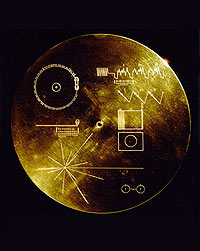Communications With Aliens: Q&A With Dr. Richard Doyle, Penn State
Published on November 29th, 2010 in: Issues, Music, Q&A, Science and Technology, Science Fiction, Three Of A Perfect Pair |By Emily Carney

The original Voyager Golden Record
Recently, Popshifter reviewed the release Scrambles of Earth from Seeland Records. This recording consists of sounds from The Voyager Golden Record (sent into space on Voyager I and II in 1977 as sort of a message to extraterrestrials and as a space “time capsule”) allegedly remixed by some sort of extraterrestrial beings. The original record consisted of songs from all over the Earth, greetings from various then-contemporary world leaders, greetings in assorted foreign languages, and 116 images of Earth life.
I recently conducted a brief Q&A with Dr. Richard Doyle, English faculty member of Penn State University, about the various transmissions which comprise this audio recording. Dr. Doyle has been described as a “Rhetorician of Alien Communication,” so I had no doubt that his answers would be enigmatic and curiosity-arousing at best. Dr. Doyle did not fail to surprise me with his answers from our brief interview.
Popshifter: Can the original Voyager Golden Record be seen as generally a “time capsule” of the period, or a genuine, heartfelt attempt to make contact with possible extraterrestrial beings?
Dr. Richard Doyle: Yes. Part of what we are learning about exercises in ET communication is that it isn’t hostile to “multivalent” logics. This is both extremely exciting and difficult to fathom. The officially sanctioned discourses of Planet Three seem to have difficulty with reality precisely because it wants to carve things up into neatly opposed terms.
Popshifter: What surprised you about the various transmissions which are showcased on Scrambles of Earth?
Dr. Doyle: I am not at liberty to discuss my specific reactions. Part of the effect of the mix seems to be to prompt listeners to reflect on their own presuppositions about “music” and “extraterrestrials.”
Popshifter: The original Voyager Golden Record was sent up in the late 1970s. What kinds of things would be showcased on a more “modern” version of this recording? (I mean, we had the birth of the Internet, etc., since this time.) Do you think humanity has dated significantly since 1977?
Dr. Doyle: Based on the few times I have listened to both, I would say that it is extremely significant that there do not seem to be any samples of Lost. What does this suggest about any ET civilizations?
Popshifter: Why is it important for young people to be interested in matters of space?
Dr. Doyle: It’s where they live.
Scrambles of Earth is available from Seeland and can be ordered online. For more on the release visit the Scrambles of Earth website.
Many thanks to Seeland and to Dr. Richard Doyle for granting Popshifter an interview.
Time limit is exhausted. Please reload the CAPTCHA.